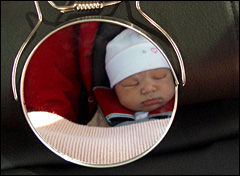Dear Umbra,
What do you recommend for child car seat disposal or, better yet, recycling? Near as I can tell, options include giving them away to someone who needs them (a pretty discouraged practice) or sending them to Oregon or Colorado where a couple of renegade recycling programs are working to resolve this huge issue. I am about to become a parent, and we just bought a new car seat (bad, I know). I’d love to know if you have any other ideas, oh brilliant eco-Umbra.
Sarah
Seattle, Wash.
Dearest Sarah,
It’s good that you bought a new car seat. The purpose of a car seat is to keep your child alive and well in the event of a crash. This is a valid reason to buy a seat with a known history and reliability, and you should not feel bad about buying a new one, just as you should not regret buying new safety helmets, new climbing gear, or other lifesaving equipment that can be invisibly damaged. Sadly, we also can’t feel too bad about throwing out unusable car seats, because the programs you tracked down are the only ones I could find.
The generally accepted guideline is not to buy or sell a used car seat over six years old — which sounds to me as if it needs to be amended to: Don’t use a car seat over six years old. Some seats have an expiration date marked somewhere on the frame, or listed on the manufacturer’s website. The plastic of the seat can (invisibly) degrade in the sun and heat of a car, and in the plain old passage of time. Additionally, used car seats should be eschewed unless you get their complete history from a person you trust. You don’t want a car seat if it has been involved in a car accident, unless that accident meets the National Highway Traffic Safety Administration’s definition of “minor.” The accident was not minor if, among other factors, the air bag deployed, the vehicle had to be towed, or anyone was injured. You can find the complete NHTSA guidelines for car seat reuse here. Also, before accepting or gifting a used car seat, check the NHTSA site to see if the seat was recalled for defects.
Those who are done with their car seats, then, should pass them on to other parents if the seat is less than six years old, has not been recalled, and passes the NHTSA guidelines. (If you’re the buyer, see these tips for assessing a used car seat.) It’s best to do this gifting in person, so that the recipient can be assured of your honesty and good intentions.
What if you have a car seat that cannot be passed along? As Sarah mentioned, car seats are recycled by community programs in Colorado and Oregon. In Colorado, a fellow started collecting and breaking down the components in his garage, and now processes more than 1,000 seats a year. In the Portland, Ore., area, a hospital collects the seats at a car seat safety event. The rest of us appear out of luck, though it can’t hurt to contact hospitals or police departments in your area to see if they have other thoughts.
If you can’t find a way to reuse the seat or a program set up to recycle seats, I think there are still a few options. Call your municipal trash team, or local recycling collection company, and ask if they will recycle the seat. Offer to disassemble it yourself. The big idea is of course to organize your own car seat recycling project. You know, once you have your baby you’ll just have oodles of free time, plus tons of energy and interest in making phone calls to arrange a major garbage collection event. Ha. I do think it must be feasible, though maybe not for a new parent, to call these other car seat recycling projects, find out how they did it, call your local plastics recycler and learn if they would accept disassembled car seats if a certain poundage of material was met, find a community organization that would sponsor the event if you came up with the volunteers, get the volunteers from an online/in-person parents’ group, and proceed forward to make Seattle recycling history. This all sounds daunting, I’m sure, but remember, you won’t need to recycle your own new car seat for another six years. By then you’ll have the energy to organize a recycling event.
If you cannot find a way to recycle a defunct car seat, don’t feel bad about throwing it out. Make sure that no one else will find and use your unsafe seat, though. Disassemble it in such a way as to make it unusable — cut the straps, separate the cover and straps from the plastic base, write “broken” on the frame in big permanent marker — and put it out for trash collection. In closing, I want to say the obvious thing about parents and driving: The best feeling we can hope for when passing on or throwing away our old car seat is that we didn’t use it very often.
Five-pointly,
Umbra


